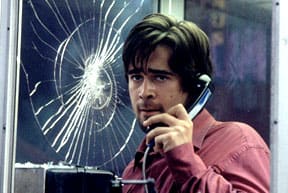A victim of unfortunate timing last fall, Phone Booth, a lean, mean thriller that revolves around a sniper threat, finally has a release date. Larry Cohen's now legendary script has been brought to the screen by Joel Schumacher, and I get the impression that he wasn't as interested in the subtext of Cohen's script (unscrupulous capitalism is on trial here) as he was in taking a high concept idea (man answers pay phone and is informed there's a rifle pointed at him) and making a tense, scrappy, low budget thriller out of it.
But Phone Booth excels in this respect; it boasts crackerjack editing and a terrific performance from Colin Farrell. He plays Stu Sheppard, a glib, amoral celebrity publicist who takes advantage of the good will of others and teeters on the verge of cheating on his wife. But when he finds himself in a phone booth on the business end of a sniper's laser-sight (a bystander is shot to drive the point home), his "master of the universe" arrogance morphs into sobbing pleas for his own life as the police and the media cluster around him, believing he's the one with the gun.
The narrative genius of Cohen's script is that Stu stays in the phone booth for 99-percent of the movie, but an entire drama plays itself out in the process. Forrest Whittaker plays a sympathetic cop trying to unravel just what's going on, and Radha Mitchell and Katie Holmes play the wife and the girlfriend, respectively, both of whom become pawns in the sniper's game. Phone Booth is a sleek 84 minutes long a model of narrative economy and that's one of its greatest virtues. It's a lean film, trimmed down to the essentials and it doesn't miss a beat.
But Phone Booth excels in this respect; it boasts crackerjack editing and a terrific performance from Colin Farrell. He plays Stu Sheppard, a glib, amoral celebrity publicist who takes advantage of the good will of others and teeters on the verge of cheating on his wife. But when he finds himself in a phone booth on the business end of a sniper's laser-sight (a bystander is shot to drive the point home), his "master of the universe" arrogance morphs into sobbing pleas for his own life as the police and the media cluster around him, believing he's the one with the gun.
The narrative genius of Cohen's script is that Stu stays in the phone booth for 99-percent of the movie, but an entire drama plays itself out in the process. Forrest Whittaker plays a sympathetic cop trying to unravel just what's going on, and Radha Mitchell and Katie Holmes play the wife and the girlfriend, respectively, both of whom become pawns in the sniper's game. Phone Booth is a sleek 84 minutes long a model of narrative economy and that's one of its greatest virtues. It's a lean film, trimmed down to the essentials and it doesn't miss a beat.
